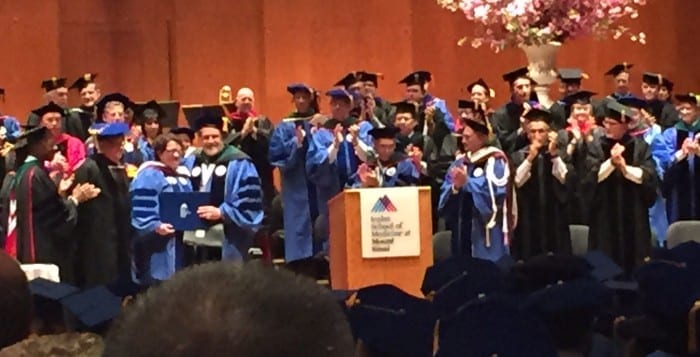Sentimental graduation hopper
Pondering the circle of life and all that

I went to my first graduation at two. My father was receiving his Master’s in Public Administration and, according to my mother, I spent the duration of the ceremony on her lap, kicking her with my white patent leather shoes.
Since then, there have been more graduations than I can properly recall — including my own — and along with an upgrade in footwear, my attention span has also much improved.
To be fair, most of the graduations I attend these days are for work, which means that I should be paying attention if I’m to properly report what occurred.
But this year, in addition to the ones I covered, I had my daughter’s moving-up ceremony from kindergarten, which marked the end of her time — and our family’s time — at the school she and my son attended for preschool and kindergarten. (Yes, there are a lot of emotions there, but I am not going to cry. Sniff!)
And, I attended my cousin Crystal’s graduation from Mount Sinai’s Icahn School of Medicine, where she received her Master’s of Public Health degree. (This is my “baby” cousin, whose kindergarten “graduation” I’d attended back in the ‘90s). And though this graduation was almost three (!!) hours, it left me inspired, hopeful and with a sense of how interconnected we all are.
One of the speakers, Dr. Ezekiel Emanuel, an oncologist, vice provost at University of Pennsylvania and leading bioethicist and health care policy reformer, practically scandalized the audience when he said something to the effect that no one remembers the speeches given at graduation. After a brief moment of indignation, I thought back to my graduations and realized that he was absolutely right. Yet, I remembered the gist of his words without the luxury of jotting them down. What made his words — and those of the medical school dean, Dr. Dennis Charney — memorable was that though they were talking about medicine and health care, they were also addressing universal truths.
Dr. Charney moved the audience by telling of the heartbreaking loss of an infant with an incurable disease. His expression of powerlessness despite the resources and knowledge at his disposal was made all the more painful when he revealed that the child had been his granddaughter. But what he wanted graduates to take away from his personal pain was the idea that they could build on the knowledge of others. He told graduates to stand on the shoulders of those who had come before them to find cures.
These are words that can resonate with us all as we strive to add to — or improve on — what pioneers in our own areas of expertise have discovered, invented or created. We also do this when we stand on the shoulders of family members who sacrificed so that our dreams could be bigger.
As for Dr. Emanuel — did I mention that he’s Chicago Mayor Rahm Emanuel’s big brother? — his words were just as wise. He said even if you are a great doctor, if the system is broken, your patient can still be harmed. Again, this is not a sentiment unique to medicine. This holds true in government, education, the judicial system and even the media. But this holds even more sway coming from a man who has worked within the system and has dedicated much of his career to fixing it. When we call on doctors and policy makers or other members of society to see beyond themselves and to work to fix what’s broken around them, we are reminded that we are a part of a larger network.
This idea of how knowledge is passed on and then used to sometimes inch, or even propel, ourselves forward came full circle at last Sunday’s Ward Melville High School graduation. The valedictorian — who will be attending my alma mater — gave a moving speech highlighting the talents of his classmates. He mentioned several of them by name before moving on to acknowledge the guidance of his junior high and high school teachers and, of course, all of the parents. He closed by urging his classmates to pay it forward. Though he didn’t say it in the way Charney did, he was telling the class of 2015 to allow others to stand on their shoulders.
Though most people don’t really enjoy all the sitting and listening and waiting, graduations are momentous occasions because they are a chance to look back before moving forward. They reinforce the bonds we have with those who have helped us, and they inspire us to be the boost that guides others to success.
This philosophy couldn’t have been more apparent as all doctors were asked to stand and recite the Oath of Maimonides with the new Icahn graduates. My Uncle Donald began his medical career as a resident at Mount Sinai and now, at his daughter’s graduation, he represented knowledge and experience.
The moment was sentimental and it was also a proclamation. It showed that we achieve with the help of others, and we achieve by helping others.






